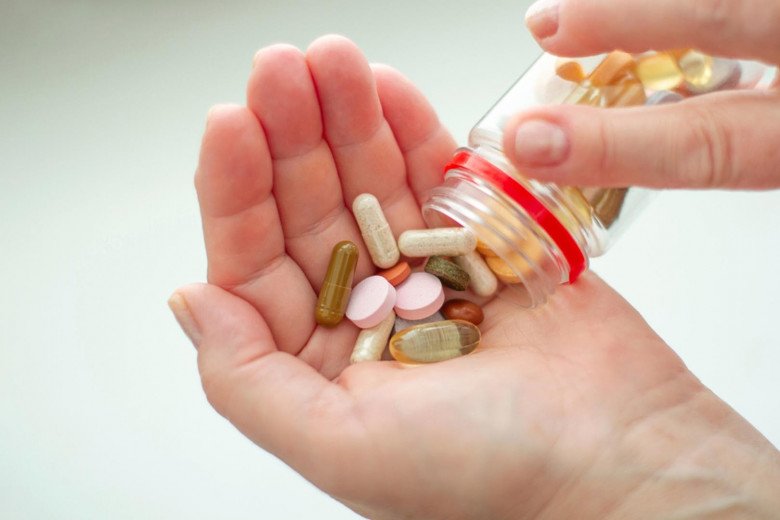Vitamin B plays an essential role in maintaining the health of your cells and keeping you energized. There are eight types vitamin B are different, all of them are in “group B”
According to the US National Library of Medicine, B vitamins help process the body uses to get or make energy from food and to help form red blood cells.
You can get all of the B vitamins from foods — especially proteins including fish, poultry, meat, eggs, and dairy. Many cereals and bread products are fortified with B vitamins, and B vitamins are found naturally in green leafy vegetables, beans, and peas.
Vitamin 3B is a multivitamin of 3 B vitamins, B1, B6 and B12.
Should you take a vitamin 3B supplement?
There are a number of conditions that make it difficult for the body to absorb B vitamins, including Crohn’s disease, Celiac disease, HIV, and alcohol abuse. In addition, if your diet is not varied and may not meet the required amount of B vitamins each day, you may consider supplementing with vitamin 3B.
Older adults and pregnant women need to supplement with some types of vitamin B. It is best to consult a doctor for the most appropriate dose of vitamin 3B supplements.
Is it good to drink 3B regularly?
As with many other supplements, you should not take 3B regularly, but only when prescribed by your doctor. Supplementing too much vitamin 3B will cause many side effects. B vitamins are water-soluble, so if the amount is more than the need, the body will eliminate it through the excretory or digestive system. However, if the supplement is too high compared to the need for a long time, the body can be poisoned because it cannot be eliminated in time.

Vitamin 3B should not be supplemented for a long time because it will lead to an overabundance
Some brand-name drugs 3B combine at doses thousands of times higher than normal needs, only used to treat neuralgia. Nor should this high dose drug be misused as a tonic that can be taken by everyone.
With vitamin 3B injectable drugs: Only used when required by a doctor, especially paying attention to how to inject into the body to be safest.
Dosage of vitamin 3B:
Medicine: Take as directed by the doctor, can take 1-2 tablets / time, 2 times a day. To treat aches and pains: take 2 tablets/time, 3-4 times a day.
For functional foods: Take 1 capsule each time, 2 times a day. Children dose is half the adult dose.
Take vitamin 3B before or after eating?
Like other vitamins, the time of ingestion greatly affects the absorption process. Therefore, choosing vitamin 3B to take is always very important. With each dosage form, there will be appropriate usage, but in general, you need to consult a doctor or medical professional to better understand.
To provide energy, relieve stress: You should drink in the morning before eating for best absorption. Because these vitamins are absorbed through the digestive tract and then excreted in the urine.
Some notes when taking vitamin 3B:
It is recommended to follow the recommended dosage of a professional when using this group of vitamins.
Not automatically increasing or decreasing the treatment dose will cause side effects or adversely affect the effectiveness of the supplement.
Pay attention to the expiration date and storage conditions before use.
Do not use alcohol, stimulants while taking vitamin 3B because it can cause interactions to reduce the effect of the drug.
Vitamin 3B is susceptible to mold even when tightly closed. You should check the medicine regularly before using it.
The effect of vitamin 3B
Vitamin 3B is a combination of 3 vitamins of group B, B1, B6 and B12. In there:
B1 is a water-soluble B vitamin, also known as thiamine. According to the National Institutes of Health (NIH), your body needs vitamin B1 to break down the fats, proteins, and carbohydrates you consume into adenosine triphosphate (ATP), the main form of energy your cells use.
Vitamin B1 also supports the health and function of your immune and nervous systems. If your diet doesn’t provide enough vitamin B1, you may be more likely to develop cataracts. Thiamine is sometimes prescribed in supplement form to treat people with deficiency syndromes, including beriberi and neuritis associated with pellagra or pregnancy.
According to the NIH, the recommended daily value (DV) of vitamin B1 for adults is about 1 milligram per day. The DV increases for those who are pregnant or breastfeeding.
Source of vitamin B1Vitamin B1 is sometimes added to food products, including fortified breakfast cereals, breads, noodles, and rice, and can also be found in supplement form.
Each type of vitamin B has its own effects
Also known as pyridoxine, vitamin B6 is needed for the synthesis of mood-affecting hormones such as norepinephrine and serotonin. Like all eight members of the vitamin B family, vitamin B6 aids in energy metabolism. B6 is also good for immune function and brain development during pregnancy and infancy.
Vitamin B6 deficiency has been linked to an increased risk of mood disorders, such as depression. According to Oregon State University, vitamin B6 helps regulate your body’s level of homocysteine, an amino acid that has been linked to an increased risk of heart disease.
Diets rich in vitamin B6 are associated with a reduced risk of developing rheumatoid arthritis and age-related macular degeneration. Women who are deficient in vitamin B6 may have more severe PMS symptoms.
The DV for vitamin B6 is at least 1.3 milligrams, according to the NIH. The DV increases for those who are pregnant or breastfeeding.
Vitamin B6 and fertility
B vitamins are generally recommended for people who are trying to conceive or are already pregnant. B vitamins, including B6, are commonly found in fertility supplements.
Some say that vitamin B6 and ovulation are closely linked: High consumption of B vitamins, including B1, B2, B3, B6 and B12 is linked to a reduced risk of infertility due to Ovulation, according to one large study, lasted into May 2008.
Vitamin B6 and fertility tend to be linked, as B6 may benefit pregnant women. According to the American Pregnancy Association, B6 may help relieve some cases of morning sickness and may prevent certain illnesses in babies, including eczema and low birth weight.
The association and the NIH both recommend no more than 100 milligrams of vitamin B6 per day, and note that almost any prenatal multivitamin contains plenty of B6 that pregnant women may need.
Source of vitamin B6B6: The richest sources of B6 include fish, beef liver and other organ meats, potatoes and other starchy vegetables, and certain fruits, according to the NIH. B6 is also added to some foods, including fortified cereals, and is available in supplement form.
Vitamin B12, also known as cobalamin, is needed for the production of DNA, hormones, and red blood cells that carry oxygen around the body. B12 contributes to the normal functioning of the nervous system and the processing of fats and carbohydrates.
This vitamin is especially important for infants, young children and adolescents. Along with vitamin B6, B12 lowers your homocysteine levels, which may reduce your risk of heart disease.
Low vitamin B12 consumption can lead to giant cell anemia, dementia, weakness, nerve damage, and loss of appetite. A B12 deficiency can increase your risk of developing anemia.
The recommended DV for vitamin B12 is about 2.4 micrograms. It is recommended to increase the DV for those who are pregnant or breast-feeding.
Vitamin B12 and fertility
Several studies have linked low vitamin B12 levels with female infertility. An October 2015 study in the journal Clinical Nutrition found that having higher levels of B12 and folate may improve fertility in women undergoing infertility treatment.
Source of vitamin B12Foods rich in vitamin B-12 include meat, seafood, poultry, and dairy products.
The 3B combination drug is often used to prevent and treat vitamin B deficiency with symptoms such as anorexia, weakness, anemia, edema, neuralgia… In particular, drugs 3B high dose injection is also used to treat neuropathic pain of unknown cause, neuritis, sciatica, back pain, disorders caused by long-term alcoholism…
at Blogtuan.info – Source: Eva.vn – Read the original article here





